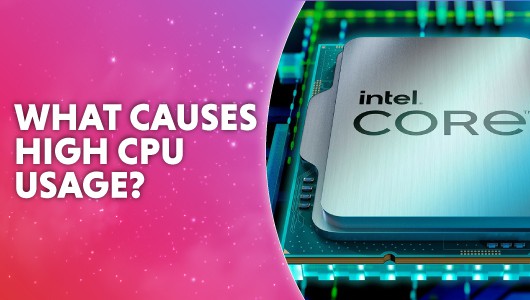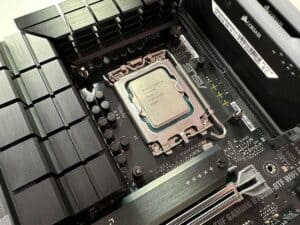What causes high CPU usage?
What causes high CPU usage? Let's find out

WePC is reader-supported. When you buy through links on our site, we may earn an affiliate commission. Prices subject to change. Learn more
CPU usage abnormally high in task manager? You would expect high usage during gaming, but if your CPU’s resources are being utilized while you aren’t doing anything particularly intensive on your system, you may have a problem. In this article, we find out what causes high CPU usage and go over fixes.
Now Read: How to stress test CPU and RAM
What is high CPU usage?
CPU usage is a percentage measure of how much of your processor is being utilized at any given time. It’s a pretty simple concept on the surface, but we dive into the more technical aspects of this metric in our dedicated article on CPU usage.
What constitutes “high” CPU usage is rather subjective, but generally speaking, a CPU operating at 10 to 20% usage can be considered idle. A high CPU usage environment could be gaming, where you can expect more than 50% of your processor’s resources to be utilized if you’re playing demanding triple-A titles.
High CPU usage is really only a problem when it occurs when you aren’t actively doing anything particularly resource-intensive.
For example, while gaming, tackling professional workloads such as video editing or rendering, running an Antivirus scan, or packing and unpacking files, having high CPU usage is completely normal. These activities are computationally demanding, and your processor has to work hard to complete them in a timely manner.
However, if you’re experiencing high CPU usage while staring at your home screen without any applications running, there may be something sapping your CPU’s resources in the background without you noticing.
How to fix high CPU usage
In most cases, if you’re experiencing high CPU usage while no resource-heavy applications are running, it’s due to background processes. You should open Task Manager, either via the Windows Search bar or by using the Ctrl + Shift + Esc shortcut.
Task Manager is a pretty convenient tool. It presents you with an overview of the processes currently active on your system along with their real-time resource utilization.
For this article, you’ll want to click on the “CPU” block at the top of its respective column to sort processes by CPU utilization. This way, you’ll easily be able to identify what’s using up your CPU’s resources.
You can shut down active processes by right-clicking on them and selecting “End task,” but don’t go about shutting down random processes on a whim – some of those may be important. You should only ever end a process if you know it’s okay to do so.
Look up the particular process that’s using your CPU on the internet to find out what it does and whether or not it’s important.
High CPU usage processes
We’ll now name some processes that are frequent culprits of high CPU utilization.
Windows Update: Windows will, by default, download and install updates whenever it can without asking for your permission. It’s recommended to have the latest updates installed, but you can disable the automatic downloads temporarily by accessing the “Windows Update Settings” menu.
Windows Defender: Defender occasionally runs scans, especially when you’ve just downloaded something new. Of course, leave this active. Most scans only last a few minutes and help ensure the safety of your system.
Superfetch or SySMain: One of the most common culprits of high CPU usage, this process loads applications you use frequently into your system memory ahead of time. It improves launch times but saps up your CPU resources, particularly after you’ve booted your computer. This process is not essential to proper functionality and can be disabled.
Suspicious activity and Malware
Sometimes, malware will disguise itself as a legit process and run in the background, using up your system’s resources to accomplish its own goals, with a popular example being mining crypto.
If you suspect that this is the case, run a complete scan of your system to identify potential security issues. Windows Defender is generally quite reliable, but you may have to go with a Premium tool or reinstall Windows to rid yourself of the problem entirely.
Final word
In conclusion, reducing CPU usage is crucial for optimal system performance. When CPU usage is high, it can cause the system to slow down, resulting in sluggish performance and reduced productivity. Additionally, high CPU usage can also lead to overheating and potential hardware damage.
By minimizing CPU usage, you can improve system stability, increase responsiveness, and extend the lifespan of your hardware. Therefore, it is essential to monitor and manage CPU usage regularly to ensure that your system runs smoothly and efficiently.





